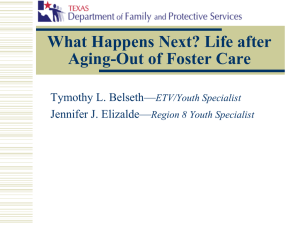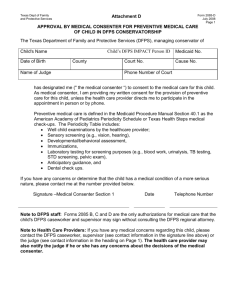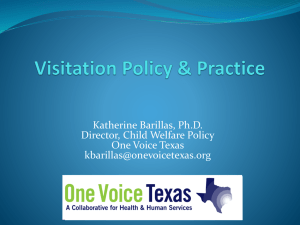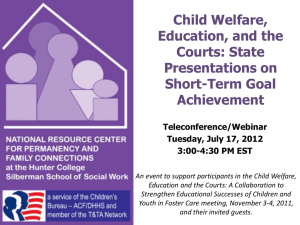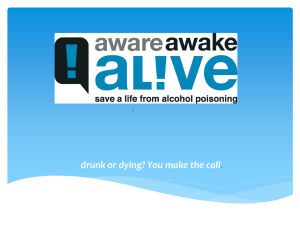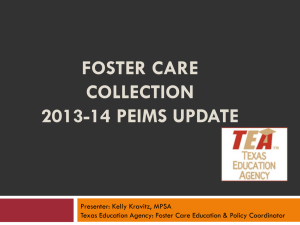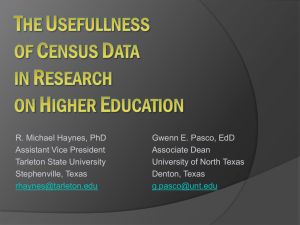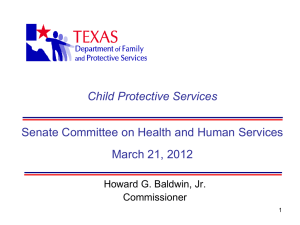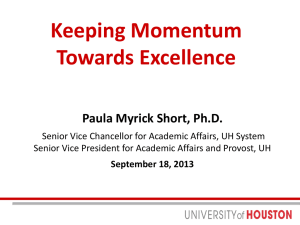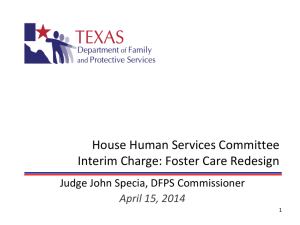Preparation For Adult Living (PAL) Program
advertisement
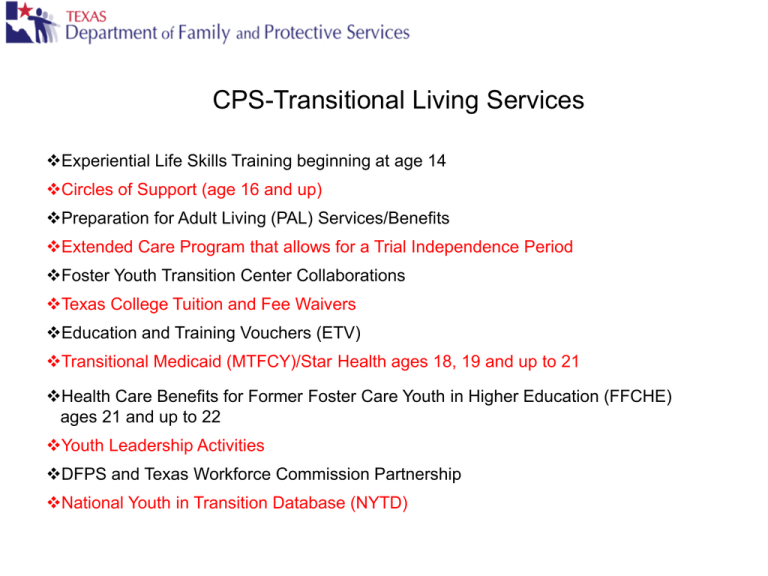
CPS-Transitional Living Services Experiential Life Skills Training beginning at age 14 Circles of Support (age 16 and up) Preparation for Adult Living (PAL) Services/Benefits Extended Care Program that allows for a Trial Independence Period Foster Youth Transition Center Collaborations Texas College Tuition and Fee Waivers Education and Training Vouchers (ETV) Transitional Medicaid (MTFCY)/Star Health ages 18, 19 and up to 21 Health Care Benefits for Former Foster Care Youth in Higher Education (FFCHE) ages 21 and up to 22 Youth Leadership Activities DFPS and Texas Workforce Commission Partnership National Youth in Transition Database (NYTD) Fostering Connections-Extended Foster Care • Effective October 1, 2010-Extended Care Assistance options increased for youth. To qualify youth must be: 18 up to 22 years of age and regularly attending high school or a GED program; or 18 to 21 years of age and regularly attending or participating in: • An institution of higher education or a postsecondary vocational or technical program (minimum 6 hours per semester); • A program or activity that promotes or removes barriers to employment; • Employed at least 80 hours a month; or • If the youth is incapable of performing all of the above activities due to a documented medical condition • Effective 9/19/2011-Trial Independence Period Young adults are now permitted to return from a trial independence period to Extended Foster Care at any time prior to their 21st birthday. After age 18, Court jurisdiction will be extended for 6 months (or 12 months if court ordered) New Supervised Independent Living (SIL) Upcoming Agency Initiative (Sept 2012) A component of the Extended Foster Care Program SIL will allow youth ages 18 up to 21 opportunities to live in a wider range of independent living settings that promote increased independence with different levels of supervision. SIL Settings will include: Host homes, non-college/college dorm settings, shared housing, and Apartments Minimum case management oversight Texas Foster Youth Transition Centers 16 Foster Youth Transition Centers are located in all 11 DFPS Regions. Serve youth 15 ½ up to age 25 Transition Centers serve as a central clearinghouse of one-stop services such as: PAL Life Skills training/Case Management Services Job readiness/Job search training and Job Placements Career exploration Provide Housing assistance Mentoring/Crisis Intervention Substance Abuse and Mental Health Counseling Collaborations and partnerships with local Colleges/ Universities to host College Fairs, assist youth with enrollment, applying for financial aid and longterm education goals. Texas State Tuition Fee Waiver-Part 1 Texas State Tuition and Fee Waiver Exemption was originally enacted in 1993 and revised in 1997, 2003, 2007 and 2009. Foster Youth Eligibility: Must be in DFPS conservatorship on or after: The day preceding the student's 18th birthday; The day of the student's 14th birthday, if also eligible for adoption on or after that day; and The date the student graduates from high school or receives the equivalent; Effective 9/1/2009-Available to students who enroll in a dual credit course or other course in which they may earn joint high school and college credit. Must be in DFPS conservatorship on the day of enrollment. Youth may access ETV funds beginning at age 16 to cover dual credit course expenses in addition to the state tuition and fee waiver. Youth must enroll in an institution of higher education as an undergraduate not later than the youth's 25th birthday. Texas State Tuition Fee Waiver-Part 2 OTHER ELIGIBLE YOUTH Adopted Youth: Adoption occurred on or after September 1, 2009 (no age range). Must enroll in higher education not later than the student's 25th birthday. Adopted and subject of an adoption assistance agreement for monthly financial assistance and Medicaid (no age limit to enroll in higher education). Effective June, 2003. Permanent Managing Conservatorship (PMC) of a Youth: PMC of the youth was granted to an individual other than the youth’s parent on or after September 1, 2009. Must enroll in higher education not later than the student's 25th birthday. Texas’ Higher Education Coordinating Board provides an academic year accounting of tuition and fees waived which is used as the 20% ETV Match. Education and Training Vouchers-Part 1 The ETV Program provides resources to specifically meet the education and training needs for youth aging out of foster care ETV Eligibility: Youth must be enrolled in a public, private, or non-profit accredited or pre-accredited institution of higher education (authorized to operate in Texas) Youth must be enrolled at least 6 credit hours per semester Based on need, ETV allows up to $5,000 in financial assistance per academic year Pays for housing/basic living expenses, tuition and fees (if applicable), transportation, books, supplies, computers, child care, etc. Limited availability to youth who enroll in dual credit courses or other courses in which they may earn joint high school and college credit May be used for on-line college courses with prior approval DFPS contracted Baptist Child and Family Services in June 2009 to administer the ETV Program 1410 youth served in Academic Year 2010-2011 Education and Training Vouchers (ETV)- Part 2 Eligible youth: Youth in foster care who are at least 16 and likely to remain care until 18; or Youth who aged out of care but have not yet turned age 21; or Not yet age 21 and are adopted after turning age 16; or Youth not yet 21 and enter Permanency Care Assistance after age 16 (New RuleBeginning Sept 1 2010). Youth age 21 up to age 23 if continuously enrolled in postsecondary education or vocational/technical training and making satisfactory academic progress. ETV is also available to youth who are in the custody of the Texas Juvenile Justice Department and are in a Title IV-E placement when turning 18. Other Higher Education Resources & Collaborations Texas Reach Conferences House Bill 452-College Housing Assistance-Winter Breaks and Summer terms Statewide Teen Conferences Scholarships for Residential Housing University of Texas at Arlington University of Texas-Pan Am Texas State University Mentoring and Support Program for students Austin Community College-Campus Champions Texas State University-San Marcos, Texas-FACES Program University of Texas-San Antonio Sam Houston State University-FORWARD Program Texas A&M University-Commerce, Texas CPS-State Transitional Living Services Shannon Ramsey: Program Lead Shannon.Ramsey@dfps.state.tx.us (512) 438-2350 Gaye Vopat: PAL/NYTD Lead Gaye.Vopat@dfps.state.tx.us (512) 438-5442 Courtney Jones State ETV/Youth Specialist Courtney.Jones@dfps.state.tx.us (512) 438-3769 Transitional Living Services Website http://www.dfps.state.tx.us/ DFPS Youth Friendly website/NYTD Survey www.texasyouthconnection.org Lead Regional PAL Staff Contact List http://www.dfps.state.tx.us/Child_Protection/Preparation_For_AdultLiving/PAL_coordinators.asp Education and Training Vouchers (ETV) http://www.bcfs.net/ETV
